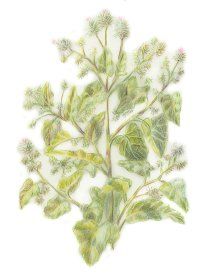Have you ever returned from a romp with your dog and found burrs on your clothing and in your pup's fur? Then you've literally come in contact with burdock. Arctium bears its seeds in the form of small spherical burrs, hence the name burdock.
Close examination of a burdock burr reveals a small hook on the end of its tiny spikes. These hooks catch on the fur of passing animals or on the clothes of passing people, thus dispersing the plant's seeds. Burdock was the inspiration for Velcro fasteners!
Advertisement
But Burdock is more than just a sticky substance. By using the roots, or in some cases, its leaves and seeds, burdock can be utilized in a number of herbal remedies to aid in digestion and more.
Uses of Burdock
Burdock is a perennial whose roots, leaves, and sometimes its seeds are used widely in herbal medicine to support liver function and as a cleansing botanical. Like dandelion and yellow dock, burdock roots are bitter and thus capable of stimulating digestive secretions and aiding digestion. These roots are referred to as "alterative" agents -- capable of enhancing digestion and the absorption of nutrients and supporting the elimination of wastes. Any botanical capable of these important actions can attain far-reaching improvements in a variety of complaints.
Burdock seeds and roots may be useful in treating a variety of skin conditions, including acne and dryness, especially when these complaints are due to poor diet, constipation, or liver burden. The liver plays an important role in removing impurities from the blood, producing bile to digest fats, metabolizing hormones, and storing excess carbohydrates, in addition to its other functions.
Everything absorbed from the digestive tract goes directly to the liver to be filtered, so when you eat foods that contain pesticides, preservatives, artificial coloring and the like, you give your liver extra work to do. A high-fat diet also forces your liver to work harder because it must break down the fat with the bile it produces. Add to this all of the potential toxins to which we are exposed in daily life that the liver must remove from the bloodstream (car exhaust, nicotine, prescription drugs, alcohol, cleaning products, industrial toxins, etc.), and you can see how the liver can become overworked or burdened.
When the amount of toxic substances in a person's bloodstream exceeds the liver's capacity to remove them from circulation, the offending substances get stored in the body. The accumulated toxins are stored in body fats, primarily, but they can produce numerous symptoms, including headaches, acne, itching, nausea, arthritis, and other complaints. For this reason, many herbalists and naturopathic physicians recommend internal use of alterative herbs for chronic headaches, chronic gas and indigestion, and acne and other skin complaints.
Burdock leaves and roots contain significant amounts of fiber that can help keep the bowels regular and promote growth of healthy bacteria in the colon. In fact, the root consists of nearly 50 percent inulin, an important fiber. A study in England found that inulin promotes the growth of bacteria that have the ability to control inflammation and eliminate unwanted pathogens, such as those that cause diarrhea. (Inulin also is found in the roots of other asteraceae plants including dandelions and Jerusalem artichokes.)
Burdock is useful in cases of hormone imbalance that are not attributable to uterine fibroids, cancer, or other diseases. Many conditions, such as premenstrual syndrome, fibroids, and endometriosis, are associated with excess estrogen levels. Because of its alterative action, and because of the small amount of plant steroids it contains, burdock can help improve the liver's ability to metabolize hormones such as estrogen and thereby improve symptoms associated with hormonal imbalance.
In the next section, you will learn how to prepare burdock for herbal remedies and some of the potentially dangerous side effects.
To learn more about treating common medical conditions at home, try the following links:
- For an overview of all of our herbal remedies, go to the main Herbal Remedies page.
- To learn more about treating medical conditions at home, visit our main Home Remedies page.
- One of the best things you can do for your health and well being is to make sure you are getting enough of the vital nutrients your body needs. Visit our Vitamins page to learn more.
This information is solely for informational purposes. IT IS NOT INTENDED TO PROVIDE MEDICAL ADVICE. Neither the Editors of Consumer Guide (R), Publications International, Ltd., the author nor publisher take responsibility for any possible consequences from any treatment, procedure, exercise, dietary modification, action or application of medication which results from reading or following the information contained in this information. The publication of this information does not constitute the practice of medicine, and this information does not replace the advice of your physician or other health care provider. Before undertaking any course of treatment, the reader must seek the advice of their physician or other health care provider.Before engaging in any complementary medical technique, including the use of natural or herbal remedies, you should be aware that many of these techniques have not been evaluated in scientific studies. Use of these remedies in connection with over the counter or prescription medications can cause severe adverse reactions. Often, only limited information is available about their safety and effectiveness. Each state and each discipline has its own rules about whether practitioners are required to be professionally licensed. If you plan to visit a practitioner, it is recommended that you choose one who is licensed by a recognized national organization and who abides by the organization's standards. It is always best to speak with your primary health care provider before starting any new therapeutic technique.
Advertisement
